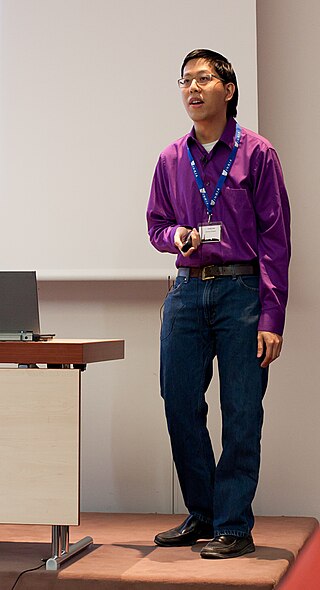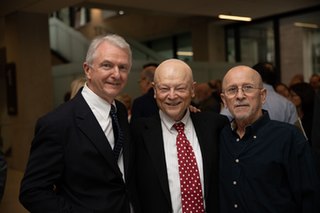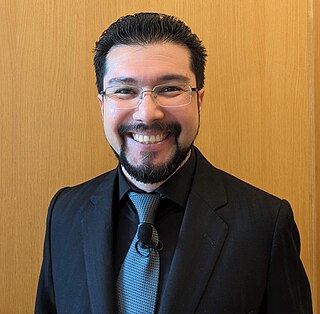
NICTA was Australia's Information and Communications Technology (ICT) Research Centre of Excellence and is now known as CSIRO's Data61. The term "Centre of Excellence" is common marketing terminology used by some Australian government organisations for titles of science research groups. NICTA's role was to pursue potentially economically significant ICT related research for the Australian economy.

Timothy Moon-Yew Chan is a Founder Professor in the Department of Computer Science at the University of Illinois at Urbana–Champaign. He was formerly Professor and University Research Chair in the David R. Cheriton School of Computer Science, University of Waterloo, Canada.
Victor Shoup is a computer scientist and mathematician. He obtained a PhD in computer science from the University of Wisconsin–Madison in 1989, and he did his undergraduate work at the University of Wisconsin-Eau Claire. He is a professor at the Courant Institute of Mathematical Sciences at New York University, focusing on algorithm and cryptography courses. He is currently a Principal Research Scientist at Offchain Labs and has held positions at AT&T Bell Labs, the University of Toronto, Saarland University, and the IBM Zurich Research Laboratory.
Expenditures by Canadian universities on scientific research and development accounted for about 40% of all spending on scientific research and development in Canada in 2006.

Anastasios (Tas) Venetsanopoulos was a professor of electrical and computer engineering at Toronto Metropolitan University in Toronto, Ontario and a professor emeritus with the Edward S. Rogers Department of Electrical and Computer Engineering at the University of Toronto. In October 2006, Venetsanopoulos joined what was then Ryerson University and served as the founding vice-president of research and innovation. His portfolio included oversight of the university's international activities, research ethics, Office of Research Services, and Office of Innovation and Commercialization. He retired from that position in 2010, but remained a distinguished advisor to the role. Tas Venetsanopoulos continued to actively supervise his research group at the University of Toronto, and was a highly sought-after consultant throughout his career.
The Department of Computer Science at the University of British Columbia was established in May 1968. UBC CS is located at the UBC Point Grey campus in Vancouver, British Columbia, Canada. As of November 2023, it has 66 faculty, 64 staff, 259 graduate students, and 2,774 undergraduates.
Hossein Rahnama is a Canadian computer scientist, specialising in ubiquitous and pervasive computing. His research explores artificial intelligence, mobile human-computer interaction, and the effective design of contextual services. In 2017, Rahnama was included in Caldwell Partners' list of "Canada’s Top 40 Under 40". In 2012, he was recognized by the MIT Technology Review as one of the world’s top innovators under the age of 35 for his research in context-aware computing. The Smithsonian named Rahnama as one of the top six innovators to watch in 2013. Rahnama has 30 publications and 10 patents in ubiquitous computing, serves on the board of Canadian Science Publishing, and was a Council Member of the National Sciences and Engineering Research Council (NSERC). Rahnama is also a visiting scholar at the Human Dynamics group at MIT Media Lab in Cambridge, MA. He has a PhD in Computer Science from Ryerson University. Rahmnama is an associate professor in Toronto Metropolitan University's RTA School of Media and Director of Research & Innovation at the university's Digital Media Zone.
Sheelagh Carpendale is a Canadian artist and computer scientist working in the field of information visualization and human-computer interaction.
Wilfred Keith Hastings was a Canadian statistician. He was noted for his contribution to the Metropolis–Hastings algorithm, the most commonly used Markov chain Monte Carlo method (MCMC).
Ming Li is a Canadian computer scientist, known for his contributions to Kolmogorov complexity, bioinformatics, machine learning theory, and analysis of algorithms. Li is currently a University Professor at the David R. Cheriton School of Computer Science at the University of Waterloo. He holds a Tier I Canada Research Chair in Bioinformatics. In addition to academic achievements, his research has led to the founding of two independent companies.
The Australian Centre for Robotic Vision, formerly Australian Research Council Centre of Excellence for Robotic Vision or ARC Centre of Excellence for Robotic Vision, is an unincorporated collaborative venture with funding of A$25.6m over seven years to pursue a research agenda tackling the critical and complex challenge of applying robotics in the real world.

Raquel Urtasun is a professor at the University of Toronto. Urtasun uses artificial intelligence, particularly deep learning, to make vehicles and other machines perceive the world more accurately and efficiently.

Luis A. Seco is a Spanish economist and mathematician who is the director of Canadian based RiskLab, a global-based laboratory headquartered in Toronto that conducts research in financial risk management. Seco is also president and CEO of Sigma Analysis & Management Ltd.
Claire Deschênes is a Canadian mechanical engineer, an engineering professor at the Department of Mechanical Engineering Université Laval, and a member of the Order of Canada. She is the first female professor of engineering at the Faculty of Science and Engineering at Laval University, and is an expert in hydraulic turbine technology, hydrodynamics, and fluid mechanics.

Mark Giesbrecht is a Canadian computer scientist who is the 12th dean of the University of Waterloo’s Faculty of Mathematics, starting from July 1, 2020. He was the Director of the David R. Cheriton School of Computer Science at the University of Waterloo, Canada from July 2014 until June 2020.

Joseph C. Paradi is a senior professor of chemical engineering at the University of Toronto. Paradi is the founder and executive director of the Centre for Management of Technology and Entrepreneurship. He is also a chair holder in Information Engineering, Department of Chemical Engineering and Applied Chemistry.
Vida Dujmović is a Canadian computer scientist and mathematician known for her research in graph theory and graph algorithms, and particularly for graph drawing, for the structural theory of graph width parameters including treewidth and queue number, and for the use of these parameters in the parameterized complexity of graph drawing. She is a professor of electrical engineering & computer science at the University of Ottawa, where she holds the University Research Chair in Structural and Algorithmic Graph Theory.
Aaron R. Wheeler is a Canadian chemist who is a professor of chemistry and biomedical engineering at the University of Toronto since 2005 with cross-appointment at Institute of Biomedical Engineering and Terrence Donnelly Centre for Cellular and Biomolecular Research. His academic laboratory is located at Lash Miller Chemical Laboratories and Terrence Donnelly Centre for Cellular and Biomolecular Research at the University of Toronto. In 2005, Wheeler was appointed as assistant professor and Tier II Canada Research Chair then promoted to associate professor in 2010, full professor in 2013, and in 2018 he became the Tier I Canada Research Chair in Microfluidic Bioanalysis.

Matt Davison is a Canadian mathematician and university professor. He is a currently serving as Professor at the Departments of Statistical & Actuarial Science and Mathematics, Dean of the Faculty of Science at Western University. Davison is also the Director of Canada's Financial Wellness lab.

Cristián Bravo is a Chilean academic. He currently holds a Professor position at the Departments of Statistical & Actuarial Science, and is the Canada Research Chair in Banking and Insurance Analytics at Western University. He is also the Director of the Banking Analytics Lab, a lead researcher at Canada's Financial Wellness lab, and a recurrent panelist at CBC News.








